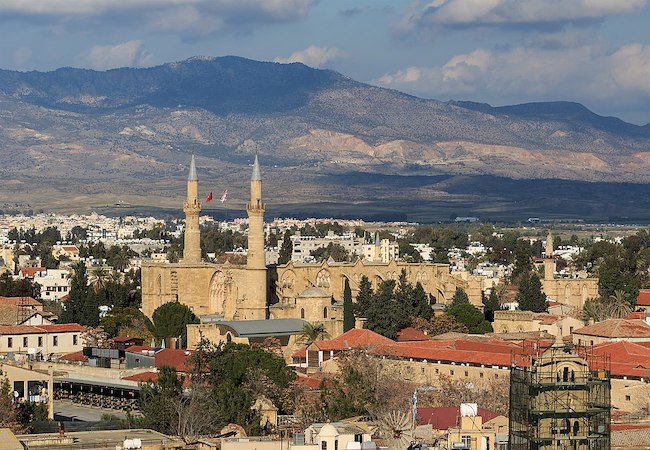
By Mustafa Lakadamyalı
Just last month, the Greek Cypriots voted for their new leader, Nikos Christodoulides, who was quick to set the tone for his country’s foreign policy posture, professing among his top objectives the resolution of the longstanding Cyprus issue. And yet Mr. Christodoulides’ view on how to achieve this remains the same tried-and-failed formula of the past 50 years, namely a “bicommunal bizonal federation” or “BBF”. While new leadership could have meant a fresh approach, this anachronistic stance suggests, certainly in the case of Cyprus, that “the more things change, the more they stay the same”. Some context is necessary.
A beautiful Mediterranean island, it is often forgotten that Cyprus was once the scene of decades-long massacre of Turkish Cypriots at the hands of their Greek Cypriot neighbors, who aimed to unite the island with Greece, notoriously referred to as “enosis” in Cyprus-issue parlance. While the Greek Cypriots co-signed into existence the partnership Republic of Cyprus of 1960 with the Turkish Cypriot co-inhabitants of the island, this partnership was tragically short-lived.
Between 1963 and 1974, the Turkish Cypriots were forcibly expelled from government, killed or forced into enclaves, and left with no legal, national or international representation whatsoever. In fact, the United Nations had to send a peacekeeping force (UNFICYP) to the island as early as 1964, noting that peacekeeping and peacemaking had to go hand in hand to find a lasting peace. The success of the latter depended on the mutual consent of the two sides.
Although negotiations to resolve this conflict between two former partners started in 1968, this didn’t stop Greece from staging a coup on the island in 1974, who, along with its Greek Cypriot collaborators, never gave up on enosis. It was Türkiye that stepped up, using her unilateral right to intervention, as outlined in the 1960 founding Treaties, which Greece and the United Kingdom are also party to, bringing peace to the island.
That the Greek Cypriots today claim to be the sole government capable of representing both sides does not hold true in the face of the realities on the ground. In fact, there have been two separate administrations on the island since 1963. The democratic and sovereign Turkish Republic of Northern Cyprus, albeit unrecognized by the international community except by Türkiye, enjoys every element of statehood. It is a case-in-point to exemplify the politics of recognition as an act of international law.
As things stand, nearly 60 years after UN peacekeeping troops touched the ground and 55 years since formal negotiations began, if there is one thing we have learned from numerous failed rounds of negotiations due to Greek Cypriot rejection — most notably the Annan Plan of 2004 and the Crans-Montana conference of 2017 – it is that, as famously put by Albert Einstein, “insanity is doing the same thing over and over and expecting different results”. The situation in Cyprus has come to a cyclical impasse, where the Turkish Cypriots, at no fault of their own, continue to be subjected to living as outsiders with practically maximal social, economic, and political isolation.
On the other hand, we have a unique opportunity to work with our Greek Cypriot neighbors. For this to be possible, the international community’s consensus that “the political status quo on the island is unacceptable” must be honored. They must also cease to insist on the same settlement model, a “BBF”, that has been a proven failure in the past. In other words, if we truly wish to achieve progress on the island, we must heed the call of the UN Secretary-General to “think outside the box”.
Up until now, only the Turkish Cypriots have done so, by devising the most logical way forward: structured cooperation and good neighborly relations between two states with sovereign equality and equal international status. This would surely be in the interest of both peoples on the island, and also contribute to regional peace and stability.
With this aim in mind, the Turkish Cypriots have made concrete cooperation proposals on issues that are not politically charged and which affect the daily lives of everyone on the island. These include cooperation on transition to green energy through solar energy, water resources, electricity interconnectivity, demining, and irregular migration. Lastly, and perhaps most notably, the hydrocarbon reserves around the island constitute another opportunity for cooperation, particularly at a time when energy security is at the forefront of global politics. Disregarding Turkish Cypriots (as well as Türkiye) in the regional energy game cannot serve the shared goal to diversify Europe’s energy supply, given international conjuncture.
At a time when the world grapples with multiple challenges on many fronts, if the international community sincerely wishes to encourage peace, stability and cooperation in the Eastern Mediterranean, Cyprus cannot be overlooked. It’s high time to take a serious look at the novel and realistic vision of the Turkish Cypriots: a cooperative relationship between two neighbors for the benefit of the island and the wider region.
Mustafa Lakadamyalı is the representative of the Turkish Republic of Northern Cyprus in Washington, DC.




